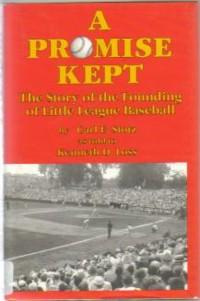Promise Kept: The Story of the Foundings of Little League Baseball – by Carl E. Stotz, as told to Kenneth D. Loss
 While the majority of the books that I post reviews of are new, occasionally I’ll get turned on to an older or more obscure book that is worth reading.
While the majority of the books that I post reviews of are new, occasionally I’ll get turned on to an older or more obscure book that is worth reading.
Such is the case with A Promise Kept: The Story of the Founding of Little League Baseball. I have to admit, I don’t recall exactly where I heard about it, although I think it was from a newspaper article somewhere. Yes, I still read the newspaper. (And you should too. )
So on a whim, I checked my local library and lo and hebold, they had it. Yes, I still use the library. (And you should too.)
The book is the story of how Little League Baseball – the institution that is commonplace in neighborhoods across not only America but around the world – came into being.
The story – a narration by Little Leauge’s founder, Carl E. Stotz – takes you back to 1938, when he was a 28 year old who simply couldn’t get baseball out of his blood and realized that there wasn’t a great option for young boys to play the game. Everything was sized for adults – the fields, the equipment, and so forth. So with his nephews as his inspiration, he set out to change that.
The challenges that Stotz faced were fairly sizable – if you’ve played Little League, think about everything that goes into the process. The equipment, the field, the rules, the sponsors – none of that was in place and Stotz had to figure out how to make all of those things come together. Factor in that the United States was still feeling the effects of the Great Depression, and you have quite a setting for getting this venture off the ground – a task that Stotz took on while maintaining a full-time job and raising a family!
Stotz, who was 82 at the time he was working on the book with Kenneth D. Loss, takes you right into the action with his first hand narration. His memories of the early days – some 50-plus years in the past at the time of the writing are amazing, from names of volunteers to the paths he had to take to convince people that his venture had merit.
Unfortunately, Stotz died before the book was finished, and Loss filled in the final four chapters with a look back at Stotz’s contributions and how the league developed under his guidance, and faced challenges as it grew and took on more players, sponsors, and obligations. Growth of any organization is never easy, and Little League was not immune.
A Promise Kept gets you as close to the founding of baseball as almost any book I’ve read. While there is ongoing debate about how the game of baseball got its start, here is a book that presents the founding of a subset of baseball in amazing detail. Stotz takes you to the empty lot that he used to determine the size the field should be by watching his nephews try and beat out grounders. You’ll accompany him into meetings with U.S Rubber Company, not just for sponsorship of the league, but to design rubber-cleated shoes for the boys, because standard sneakers weren’t able to provide enough traction and metal spikes that adults wore proved too dangerous. You’ll sit at board meetings as the growth of the league is discussed, from its birthplace of Williamsport, Pennsylvania, to other parts of the city, to other states and into foreign countries.
Carl E. Stotz is a name who should be familiar to anyone who calls themselves a baseball fan, and this book will show you precisely why. Not only did he overcome a fairly tremendous set of obstacles, he created an institution that countless people have benefitted from. To think that he was hoping that Little League Baseball would become as popular the Soapbox Derby back in 1948, to seeing it on ESPN in recent years is quite an accomplishment and testament to the wheels he put in motion some 70 years ago.
This is a great book that is worth checking out – at just under 200 pages and with a conversational writing style, it’s an easy book to jump into. The history is amazing and the application to today is easy to see. Luckily, there are enough copies still floating around to make it pretty easy to get you hands on one – something I recommend doing.